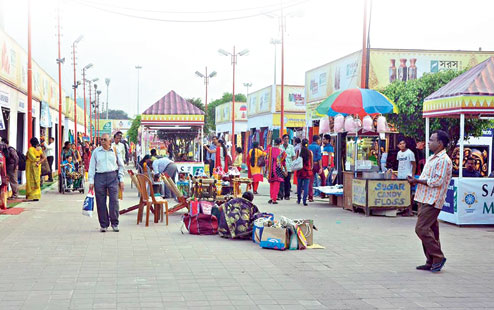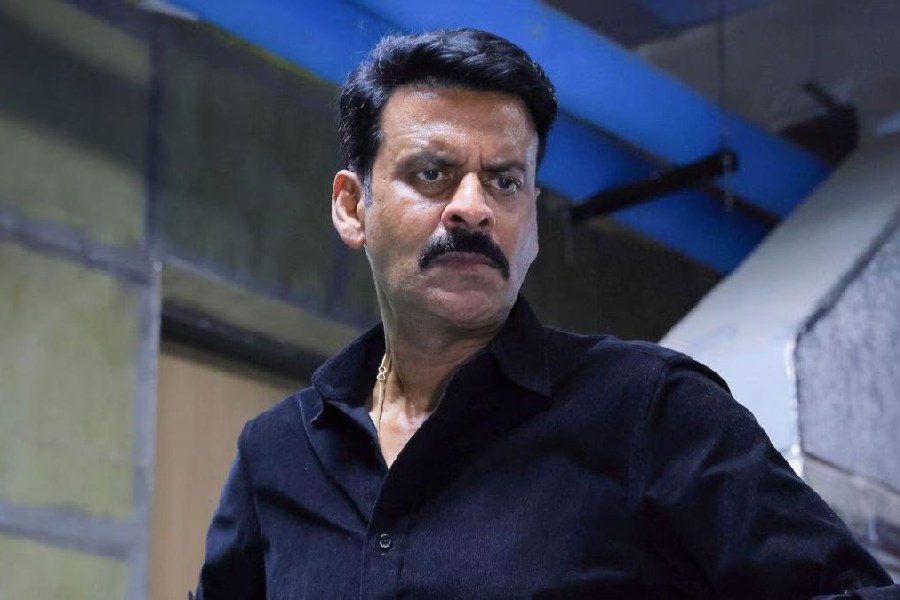
.jpg)
Saras Mela has started at the Central Park fairgrounds and will continue till December 27. Artisans have come from various states and visitors are making a beeline for the variety of products on sale. The fair is open from 12pm to 9pm and entry is free.
Saris to shrugs
Tussar silk saris from Bihar, silk wraparounds from Andhra Pradesh, warli and madhubani-painted saris from Maharashtra: the fair has brought out the best of every state.
“We have got bright ethnic jackets with phulkari embroidery for women. They’re very popular in Punjab and customers here are liking them too,” said Manoj Kumar of the Punjab counter at the B-13 stall. The sleeveless jackets, that he claims can be worn comfortably around the year, cost around Rs 2,250.
Some stalls, like the Deshaj pavilion, have trendy western wear too. The E-208 Jammu and Kashmir counter has glamorous tops and shrugs in georgette and net and the B-15 stall from Madhya Pradesh even has woollen dresses.
The Himachal Pradesh stall-keepers at B-45 are a tad disappointed. “We have rabbit wool stoles, sheep wool jackets and traditional woollen caps from Kulu. Despite finding them attractive, visitors are wary of buying them as the temperature has hardly dipped in Calcutta’s this winter,” says Lajjo from behind the stall.
.jpg)
.jpg)
Art and craft
The fair is stacked with lampshades of various styles — leather ones with traditional motifs from Andhra Pradesh and modern-looking ones made of plastic strips from Rajasthan. The latter are available in 30 shapes at the C-66 stall. There is Ganesha, tabla, bell-shaped, diamond-shaped…. “I’m taking orders too, and creating any shape in any combination of colours,” said the artisan Hansraj. The lamps cost upwards of Rs 80, with the largest 3-ft one costing Rs 1,200.
Durga Rani Mondal has come from Barackpore with attractive jewellery made of camel bones. “We get the raw material from Rajasthan and paint over them. When ready they resemble stones but they are much lighter,” she said.
Filigree has been brought from Odisha and resin jewellery from Goa. “We know what tourists from Bengal like and have brought those designs in resin, which is a chemical made of tree gum and is cheaper than stones,” said Lokman Basha.
There are woollen carpets from UP, blue pottery from Rajasthan and patachitra from Odisha. There’s also a nursery from Siliguri selling saplings of Poinsettia, Rabbit’s Foot Fern, Rose etc.
Food for thought
From tidbits like pickle and churan to ayurvedic pills that claim to reduce weight, edibles are an important part of Saras Mela.
“People think this is gourd (lau) but this is a green brinjal,” said Swapan Halder of Malda. He says the green variety of brinjals, at Rs 50 a piece, are sweeter than their purple counterparts. “Last year, I had sold five quintals at this fair.”
The Malda stall also sells Aamshottwo and a Bashirhat stall sells jaggery. “We sampled the patali and it was sweet. I’m taking home some to make payesh with,” smiled Malancha Dasgupta, a visitor from AE Block. The patali costs Rs 120/kg and nolen gur Rs 140/kg.
.jpg)
The food court sells chaats, chops, cutlet and winter sweets like bhapa pithe, chushi pithe, gokul pithe and doodh puli.
The G-9 stall displays what looks like huge, but crisp, baturas. “This is Dhakai Parota,” smiles Rupasri Singh of West Midnapore. “It’s served with Alur Dom and salad and costs Rs 40 a piece.”
But Gouri Roy, a visitor from CG Block, begged to differ. “This is Bakarkhani. That’s what we called it back in Comilla, Bangladesh,” she said, excited to see the Dhakai Porota. They’re difficult to make but delicious.”
.jpg)
The Kashmiri tea kahwa is being served at E-202. “Eleven ingredients go into making this tea — kesar, elaichi, dalchini, walnuts..... It’s said that the perfectly-made kahwa removes 100 ailments,” smiles Farida, serving a cup from the samovar (a tea urn lit with coal) that brews the beverage all day. A cup costs Rs 30 and packets of tea cost Rs 50.











